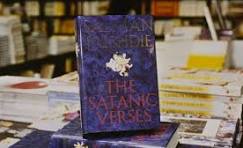Salman Rushdie to Write Book on Decade in Hiding
By wchung | 28 Feb, 2026
Novelist Salman Rushdie plans to write a book about his decade in hiding under a death threat from the Iranian government using a digital archive of his personal papers housed at Emory University, he said Tuesday.
Rushdie, who is in the middle of a five-year stint as a distinguished lecturer at the Atlanta university, has donated his literary archive to Emory’s special collections library. The university created an exhibit from the manuscripts, letters and photographs that opens Friday and runs through September.
“It’s my story, and at some point, it needs to be told,” he said during a news conference before touring the exhibit with reporters. “That point is getting closer, I think. When it was in cardboard boxes and dead computers, it would have been very, very difficult, but now it’s all organized.”
He donated the collection to Emory in 2006, but it’s been closed to the public since then so that it could be catalogued and transferred into a digital format. Now the archive is open for review by scholars, students and others interested Rushdie’s work.
Rushdie, 62, was forced into hiding in England for a decade because the Ayatollah Khomeini of Iran issued a 1989 fatwa, or religious edict, ordering Muslims to kill the author, saying his book, “The Satanic Verses,” insulted Islam. The Iranian government declared in 1998 that it would not support the fatwa but could not rescind it.
Still, some hardline Muslim groups have protested Rushdie in recent years and threatened to boycott organizations that are associated with him. Rushdie has said the fatwa is more “a piece of rhetoric than a real threat” now.
The collection at Emory includes private journals Rushdie kept during his time in hiding, but Emory officials say those documents won’t be open to the public until after his death. The collection also includes manuscripts from many of his novels, unpublished works, photos of him as a child and letters from public figures supporting him after the fatwa was issued.
One wall is filled with Post-It notes he’s made while working on novels and other writing.
“I never realized my doodles would have been blown up to 3 feet tall,” he said about the exhibit. “From the moment I agreed to do this, I knew it was going to be sort of embarrassing.”
While on campus, the India native will teach classes, give lectures and work with faculty and students. He said the experience teaching has been “enormously pleasurable.”
“You get to sit in a room with intelligent, young people and talk about books you like. What’s wrong with that?”
Emory began courting Rushdie in 2004 after he delivered a series of lectures. He said in 2007 that he chose Emory to house his archive because it was the only university that asked him for his papers, noting that they would be in good company.
The university has the archived collections from many well known writers, including Seamus Heaney, James Weldon Johnson, Flannery O’Connor and Alice Walker.
Rushdie’s novel “Midnight’s Children” won Britain’s Booker Prize, and was selected in 1993 as the best novel in 25 years of the Booker Prize.
He was knighted in 2007 by Queen Elizabeth II of England, the same year he divorced model and “Top Chef” host Padma Lakshmi after three years of marriage. He lives most of the year in England, where he is a citizen.
2/23/2010 6:36 PM DORIE TURNER, Associated Press Writer ATLANTA

Asian American Success Stories
- The 130 Most Inspiring Asian Americans of All Time
- 12 Most Brilliant Asian Americans
- Greatest Asian American War Heroes
- Asian American Digital Pioneers
- New Asian American Imagemakers
- Asian American Innovators
- The 20 Most Inspiring Asian Sports Stars
- 5 Most Daring Asian Americans
- Surprising Superstars
- TV’s Hottest Asians
- 100 Greatest Asian American Entrepreneurs
- Asian American Wonder Women
- Greatest Asian American Rags-to-Riches Stories
- Notable Asian American Professionals

